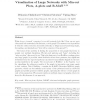470 search results - page 83 / 94 » The Foundations for Provenance on the Web |
AAAI
2006
13 years 9 months ago
2006
Description Logics (DLs) are the formal foundations of the standard web ontology languages OWL-DL and OWL-Lite. In the Semantic Web and other domains, ontologies are increasingly ...
IJMMS
2007
13 years 7 months ago
2007
What does a ‘normal’ computer (or social) network look like? How can we spot ‘abnormal’ sub-networks in the Internet, or web graph? The answer to such questions is vital f...
JAIR
2012
11 years 10 months ago
2012
To achieve scalability of query answering, the developers of Semantic Web applications are often forced to use incomplete OWL 2 reasoners, which fail to derive all answers for at ...
SAC
2004
ACM
14 years 1 months ago
2004
ACM
A popular solution to internet performance problems is the widespread caching of data. Many caching algorithms have been proposed in the literature, most attempting to optimize fo...
ICDE
2003
IEEE
14 years 9 months ago
2003
IEEE
Analyzing sequence data has become increasingly important recently in the area of biological sequences, text documents, web access logs, etc. In this paper, we investigate the pro...

